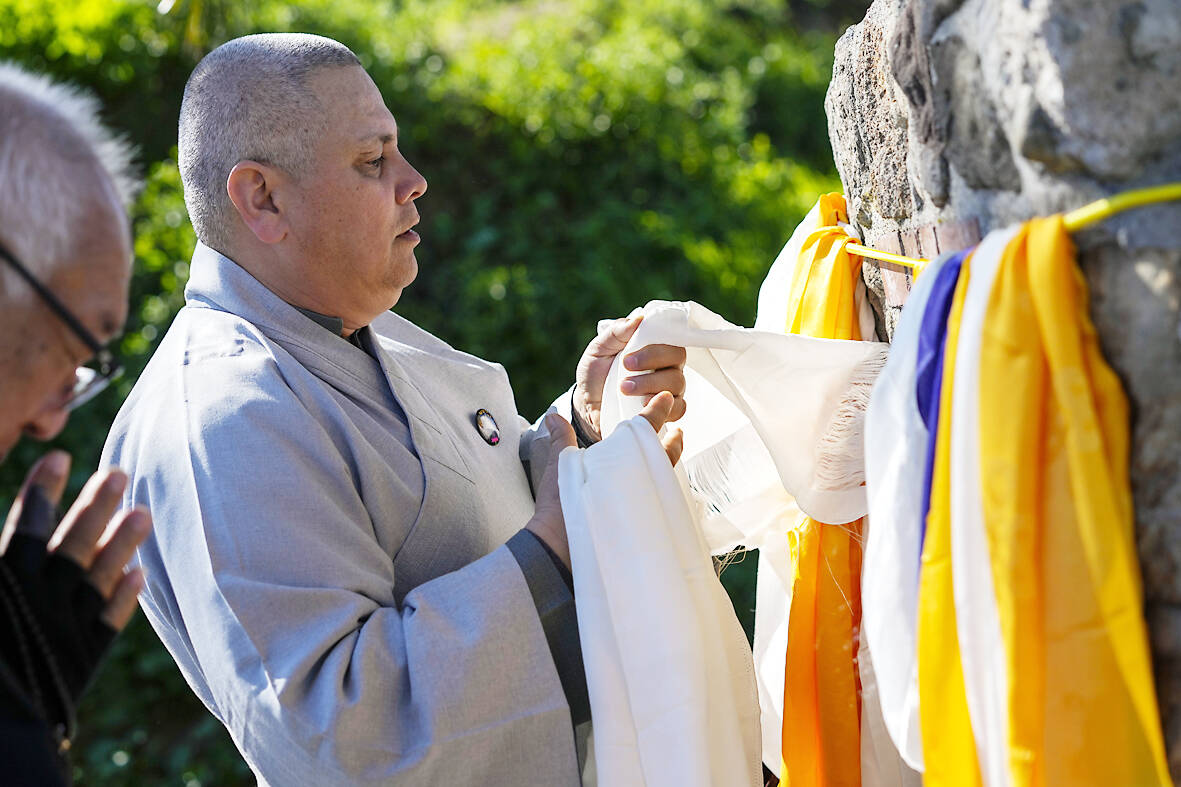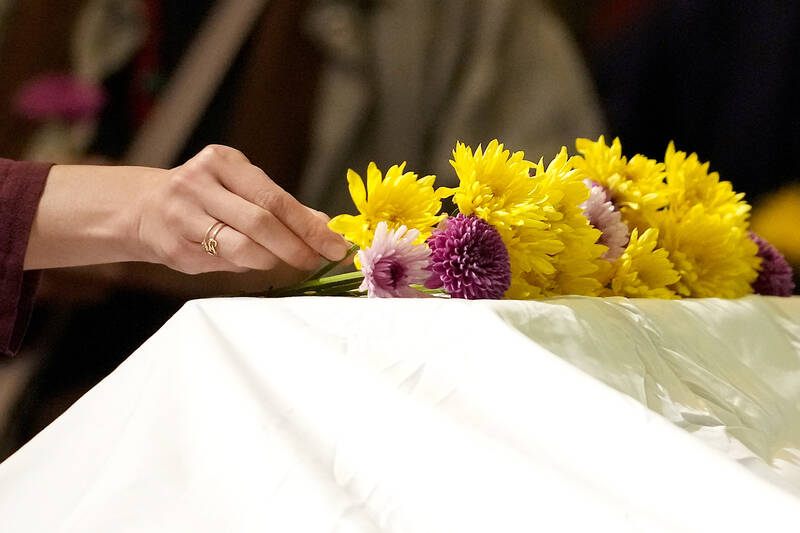For one afternoon, on Antioch’s main street and tranquil riverbank, the fragrance of burning incense was paired with the sound of Buddhist and Tao chants. Their cumulative calming energy was meant to be a balm of sorts to soothe the racial and religious hate that cast a shadow on Antioch’s legacy.
Antioch’s dark past, specifically its horrific mistreatment of early Chinese immigrants, motivated about 200 Buddhists to undertake a recent pilgrimage to the city of about 115,000, tucked deep in the delta that drains into the San Francisco Bay. Their goal was to supplant the negative with the positive by reconciling a dreadful past and anxiety-filled present — both time periods when Asian Americans nationwide have faced hate and discrimination — with the hope for a more egalitarian and harmonious future.
In the 1800s, thousands of Chinese immigrants came to the area during the gold rush to work in mines, and build railroads and levees. Those who lived in Antioch were subject to sundown laws and used secret tunnels to commute to and from work, according to local newspaper reports. Eventually, the city’s Chinatown spanning a couple of city blocks — which also housed a Buddhist/Tao temple where new immigrants congregated — was burned down.

Photo: AP
‘MAY WE GATHER’
On Saturday, the group of Buddhists gathered for the pilgrimage, an event they titled “May We Gather.” It was intentionally scheduled on the third anniversary of the Atlanta mass shooting when a white gunman targeted female employees at Asian American massage parlors because he saw them as “sources of temptation.” Six of the eight victims were women of Asian descent.
Duncan Williams, a Soto Zen priest of Japanese descent and one of the event’s organizers, said the Atlanta killings bore eerie similarity to Antioch in 1876 when raging locals burned down the homes of Chinese women branded as sex workers. In 2021, Antioch became the first US city to issue a public apology for the mistreatment of early Chinese immigrants during the gold rush.

Photo: AP
Williams, who also is a religion professor at the University of Southern California, said event organizers desired not just a political reaction, but “a Buddhist response that draws on our teachings and practice,” which aims to honor ancestors and heal racial trauma, past and present.
So in Antioch’s El Campanil Theater, a gathering of Buddhist monks and leaders from across the diaspora engaged in a process of “karmic healing.” They offered chants and prayers at the altar of the thousand-armed Guan Yin, the goddess of mercy and compassion. Four tablets rested at the altar bearing the names of victims of hate and violence.
The Buddhists in attendance came from various countries and traditions — Chinese, Vietnamese, Japanese, Korean, Laotian, Thai, Tibetan, Indian and Sri Lankan. Holy chants rang out in multiple languages including Pali, the antiquated language closest to what the Buddha himself spoke.
Grace Song, an ordained minister and a department chair at the Won Institute of Graduate Studies in Warminster, Pennsylvania, said she had never been part of a peace-building event that celebrated diverse Buddhist traditions until now.
“I hope we get closer, build solidarity and support each other as we deepen our roots in this country,” she said.
Khenpo Paljor, a Tibetan lama from Des Moines, Iowa, offered prayers at the Birthplace of Antioch marker erected in 1850 by the first European settlers. Here, attendees placed multi-colored Tibetan kata, which are traditional prayer scarves. Williams said the colored scarves reflect a Buddhist scripture that speaks of pure souls as colored lights shining in unison, with none canceling out the others.
For Cristina Moon, a Honolulu-based Zen priest, karmic healing is the process of changing “our relationship to what happened and the ways in which we can control how to act in the future.”
“It’s important we recognize what happened and acknowledge it’s uncomfortable,” she said. “It’s about not getting stuck in a painful past but moving forward in a positive manner.”
RECLAIMING TRADITIONS
Russell Jeung, co-founder of Stop AAPI Hate, sees these Buddhist ceremonies as Asian Americans reclaiming their traditions to recover in “the face of moral injury.”
“When [former president Donald] Trump mocked Asians and stigmatized the group by calling (COVID) ‘the Chinese virus,’ that really is a case of moral injury, where we as Americans are betrayed by our elected officials,” Jeung said.
Hatred of the Chinese during the gold rush was fueled by political rhetoric as well. The only article that addressed a racial or ethnic group in California’s constitution, which was ratified in 1879, stated that “no Chinese shall be employed on any State, county, municipal or other public work, except in punishment for crime.”
The Chinese Exclusion Act of 1882 barred Chinese laborers from immigrating.
Kaishin Victory Matsui, a priest at the Brooklyn Zen Center, said faith can be used as a way to heal the harm of racism.
“We come to these historic sites where trauma has occurred to bring peace and healing,” she said. “The idea is to remember the past so it is not forgotten. This event connects Asians across time and ethnicity, and reminds us of how vast and powerful we are.”
Bhikkhunis (Buddhist nuns) Hyokeun and Hyung Jeon from the Korean Borisa Zen Center in Las Vegas, offered a white, ceramic lotus to Guan Yin during the ceremony.
“The lotus flower is sacred in Buddhism because it maintains its purity and beauty despite growing in the mud,” Hyokeun said. “Hatred cannot solve hatred, only compassion can.”
Tao Master Eman, a priest from the First Taoist Foundation in Arcadia, California, performed a ritual on the riverbank as participants walked silently around the block where Chinatown and its temple stood nearly 150 years ago. Eman said he called on traumatized spirits and comforted them, so they can move on to a better place.
HEALING TRAUMA
For some like Myokei Caine-Barrett, who leads a multi-ethnic Nichiren Shu Buddhist temple in Houston, coming here was about healing her own trauma. She is half Japanese and half African American, and said her faith has given her “the foundation to claim all of myself.”
“Buddhism teaches us that we cannot control how people receive us, but we can control how we respond,” she said. “Not all Asians look alike, but we are all still Asian. Our goal is recognizing and respecting each other, period.”
One of the attendees was Sasanna Yee, who has been speaking out about anti-Asian hate since her 88-year-old grandmother, Yik Oi Huang, was fatally beaten in January 2019 in a San Francisco park. Authorities charged a then 17-year-old boy in the attack. Huang died the following year.
Yee, who offered prayers and a memorial tablet at the altar where her grandmother was memorialized, saw the event as healing.
“This is a really beautiful solution to move us into the future where we connect over shared hopes and dreams,” she said.
Long-time Antioch residents viewed the event as necessary for the city to move away from its traumatic past and become more inclusive. Antioch made headlines recently after several civil rights lawsuits involving 20 plaintiffs alleged they were victims of police misconduct, excessive force and racial profiling.
Karen J. Oliver said she was horrified but not surprised to learn about how her city had mistreated Chinese immigrants.
“We all need peace and reconciliation and whatever road we can find it on, we need to take that road,” she said.
Frank Sterling, who has Indigenous roots, saw the Buddhist rituals as a major step in healing the entire community.
“You can’t do that until you acknowledge the past and there is a lot for us to move on from,” he said. “This is a good start.”

May 18 to May 24 Pastor Yang Hsu’s (楊煦) congregation was shocked upon seeing the land he chose to build his orphanage. It was surrounded by mountains on three sides, and the only way to access it was to cross a river by foot. The soil was poor due to runoff, and large rocks strewn across the plot prevented much from growing. In addition, there was no running water or electricity. But it was all Yang could afford. He and his Indigenous Atayal wife Lin Feng-ying (林鳳英) had already been caring for 24 orphans in their home, and they were in

President William Lai (賴清德) yesterday delivered an address marking the first anniversary of his presidency. In the speech, Lai affirmed Taiwan’s global role in technology, trade and security. He announced economic and national security initiatives, and emphasized democratic values and cross-party cooperation. The following is the full text of his speech: Yesterday, outside of Beida Elementary School in New Taipei City’s Sanxia District (三峽), there was a major traffic accident that, sadly, claimed several lives and resulted in multiple injuries. The Executive Yuan immediately formed a task force, and last night I personally visited the victims in hospital. Central government agencies and the

Australia’s ABC last week published a piece on the recall campaign. The article emphasized the divisions in Taiwanese society and blamed the recall for worsening them. It quotes a supporter of the Taiwan People’s Party (TPP) as saying “I’m 43 years old, born and raised here, and I’ve never seen the country this divided in my entire life.” Apparently, as an adult, she slept through the post-election violence in 2000 and 2004 by the Chinese Nationalist Party (KMT), the veiled coup threats by the military when Chen Shui-bian (陳水扁) became president, the 2006 Red Shirt protests against him ginned up by

As with most of northern Thailand’s Chinese Nationalist Party (KMT) settlements, the village of Arunothai was only given a Thai name once the Thai government began in the 1970s to assert control over the border region and initiate a decades-long process of political integration. The village’s original name, bestowed by its Yunnanese founders when they first settled the valley in the late 1960s, was a Chinese name, Dagudi (大谷地), which literally translates as “a place for threshing rice.” At that time, these village founders did not know how permanent their settlement would be. Most of Arunothai’s first generation were soldiers